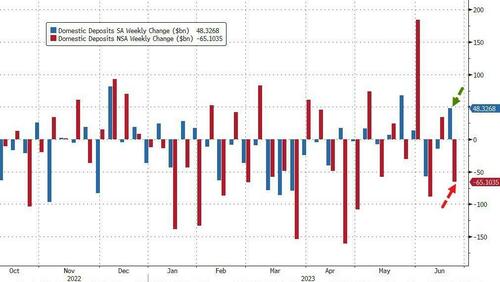from ZeroHedge:

While the US deposit fight that started with the failure of three major US banks in March, has alternated between a bank jog, run and a sprint, depending on whether one uses actual data or the Fed’s politically-mandated seasonal adjustments to deposit outflows…
… the rest of the “developed world” has so far avoided a similar cascade of bank failures (who knew that injecting trillions in reserves to artificially preserve bank viability would make them beyond brittle and terminally fragile the moment liquidity was withdrawn) and by extensions, a sweeping bank run.
TRUTH LIVES on at https://sgtreport.tv/
Or maybe not, because while no other western nation suffered a recent bank crisis as painful as that of the US, it doesn’t mean that other nations are immune to deposit flight.
Consider the UK, where households just withdrew a record amount from bank accounts last month; and while in lieu of a bank failure panic that would suggest consumers are looking elsewhere for higher interest rates, the reason why deposits are fleeing banks in the US may have a much simpler reason: tapping savings to pay bills.
As the FT reported, a net £4.6bn was taken out from banks and building societies in May, the highest level of withdrawals since monthly records began in 1997, according to the Bank of England data published on Thursday.
And since the large net withdrawals from instant-access accounts were only partially offset by net inflows into fixed-term accounts, which typically pay higher rates, and individual savings accounts, which offer tax-free dividends and interest on shares or cash, this suggests that the deposit flight wasn’t the result of rate arbitrage.
BoE figures showed the effective rate on instant-access accounts dropped 8 basis points to 1.33 per cent in May. That lags considerably both the central bank’s benchmark rate, now at a 15-year high of 5 per cent, and rates for two-year fixed mortgage deals, which are above 6 per cent.
In its latest report, the BoE’s Monetary Policy Committee noted that “the pass-through [of higher interest rates]” to these accounts had “been unusually weak” since it began raising rates in December 2021.
So if not merely moving deposits from Bank A to Bank B, what’s going on? According to Ashley Webb, UK economist at consultancy Capital Economics, some of the fall to “people moving money into other investments outside of the banking sector, such as UK gilts”. But he added: “It’s possible that households’ pandemic savings are being depleted to support spending.”



